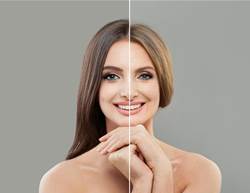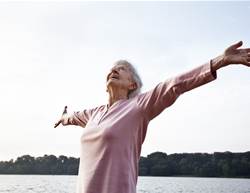We all want to look and feel great for our age. And the more science discovers about how we age, the more it becomes clear that some simple lifestyle hacks can help your body to be not only healthier but look younger, too! Here’s some more good news. There are plenty of other benefits to turning back the clock than just glowing with good health. “Most of the major diseases we confront rarely occur until our bodies begin to show signs of ageing,” says Dr Michael Roizen, author of the bestselling RealAge book series.
Read on for what you can do, starting today, to look and feel years younger.
Avoid worrying yourself younger
A US study of women between the ages of 20 and 50 found that those who felt the most stressed aged 10 years faster than women with the same levels of stress, but who felt more relaxed. One of the main ways scientists establish our biological age is to measure telomeres, which are the caps at the end of each chromosome in the body. These become shorter as we age.
In this study on stress, the women with the highest perceived level of stress had hastened the shortening of their telomeres. According to Dr Howard Murad – a leading authority in the field of anti-ageing – stress and anxiety not only reduce telomere length but also impair our immune response and cause ageing. To make matter worse, we become more vulnerable to chronic diseases, including heart disease, diabetes and arthritis, as well as other issues associated with ageing, such as short-sightedness and hearing loss. Dr Howard says that we “sort of worry ourselves older”.
Change your perception of stress
Dr Murad says that if you change your perception of stress, you can alter how fast you age. His research has shown that putting more feel-good activities into your life, such as yoga or even a cooking class, can actually increase the length of your telomeres. In one study he conducted, people took part in activities such as mindfulness, practising positive thinking, regular exercise and enjoying social connections with friends and family. At the end, all participants were shown to have reduced the damage to their DNA.
A similar study by Dr Dean Ornish, founder of the Preventive Medicine Research Institute, has shown that a combination of the above strategies can increase the length of telomeres. And a US study of 70,000 women, with an average age of 70, showed that the most optimistic group had a lifespan almost 15 per cent longer than the least optimistic group. Now that’s positive news!
Exercise to keep your body young
Sure, we know that turning off Netflix and doing a workout is good for our health, but how many of us realise that doing nothing makes us physically age faster? Exercise physiologist Mark McKeon says that, without active intervention after the age of 30, women on average lose two per cent of strength a year, four per cent of flexibility/mobility and about six per cent of cardiovascular fitness.
Focus on strength flexibility and cardio
“The good news is you can maintain strength and stay younger with two weekly workouts, where you do at least one set of exercises for major muscle groups until you can’t do even one more in that session,” Mark says. As you get stronger, you’ll be able to increase the number. “Also, yoga, Pilates, tai chi or stretching on a mat at home each morning will pay huge anti-ageing benefits.”
We also need cardiovascular exercise, the kind that gets our heart pumping. Mark says that if you’re returning to fitness after not being active for some time, it’s important to cut yourself some slack and not judge your success or failure by what you did in your 20s, or what others in your training class may be doing. “My best advice is to be kind to yourself by mixing it up with two to three comfortable cardio sessions each week,” he suggests.
Make exercise a lifelong habit
In a study of people over 70 who had made exercise a lifelong habit, scientists discovered that the subjects’ hearts, lungs and muscles were in equivalent shape to people in their 40s. If that’s not you, don’t despair. Further studies have shown that, regardless of your previous fitness levels, investing just 30 minutes a day into exercise can increase your lifespan. Those walking shoes, or that gym membership, really are a good investment, after all.
Eat a balanced, wholefoods diet
It’s no secret that eating a healthy, mainly plant-based diet improves your wellbeing, but how much more motivated would you be if you knew it actually took years off your age? Recent research has shown that plant-based diets increase the length of your telomeres and thus slow down the ageing process, says Sydney-based dietitian Jaime Rose Chambers.
Indeed, one study showed that edible plants contain lots of compounds with antioxidant and anti-inflammatory properties that help prevent telomeres from shortening.
One of the main reasons why the Mediterranean diet is so popular is that it’s been linked with the longevity and health of villagers around the sea who eat a certain way. Think vegetables, legumes such as lentils and beans, and good fats like those in fish and olive oil; eating seeds such as sesame, pumpkin or flaxseed; and getting plenty of carotenoids, a pigment found in orange foods such as pumpkins, carrots and salmon.
Dr Michael Elstein, GP and anti-ageing specialist, says all these foods are rich sources of antioxidants that help prevent damage to cells involved in ageing. And don’t forget good fats and oils such as almonds, pecans, walnuts, avocado and olive oil, he adds, that help keep our hearts and joints younger.
Load up on skin-loving foods
A bonus for healthy eaters is that the same foods that help keep our organs and joints in top shape also help give skin a youthful glow. Dermatologist and Mohs surgeon Dr Adam Sheridan says healthy foods rich in vitamins A, C and E, as well as foods like grapes and berries that contain a potent antioxidant called resveratrol, help the body counteract toxins that cause visible ageing, including wrinkles, pigmentation and broken blood vessels.
High-quality natural proteins that contain zinc and vitamin C support collagen and elastin production and preservation to stop skin sagging, he says, while legumes and seeds carry vitamin B3 to encourage DNA repair.
When it comes to seeking youth, Dr Sheridan says what is left out of your diet is just as important as what is included. Avoid processed, artificially coloured and high-sugar foods, as well as alcohol, tobacco and recreational drugs, he suggests. “Alcohol has slipped under the radar of many of us who are so busy,” he notes. “From a skin perspective, I would suggest that for every standard drink consumed at a sitting, you have an alcohol-free day.”
‘Eat' your water
Water is youth, says Dr Howard Murad. It helps carry nutrients and oxygen to cells and dissolves minerals and nutrients to make them more useable for your body. “When we’re babies, approximately 75 per cent of our body is water,” he says. “By the time we reach middle age, our body’s water content can be as low as 50 per cent.” While we’ve all heard the ‘drink eight glasses of water a day’ advice, Dr Murad encourages his patients to focus on increasing raw fruits and vegetables. “They contain lots of structural water that is slowly absorbed into the body to properly hydrate your cells,” he explains.
Incidentally, people with more muscle hold more water than those with a higher fat ratio, Mark McKeon says – another reason to maintain youthful muscle, through targeted exercise, as you age.
With all of these turn-back-the-clock measures within our control, it’s exciting to think that we really do have the power to make a difference to ourselves, both inside and out. So start putting these suggestions into action and get ready for those compliments!









